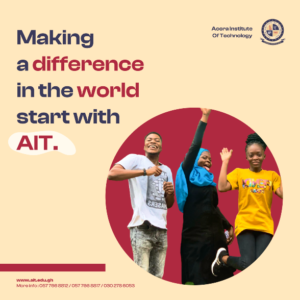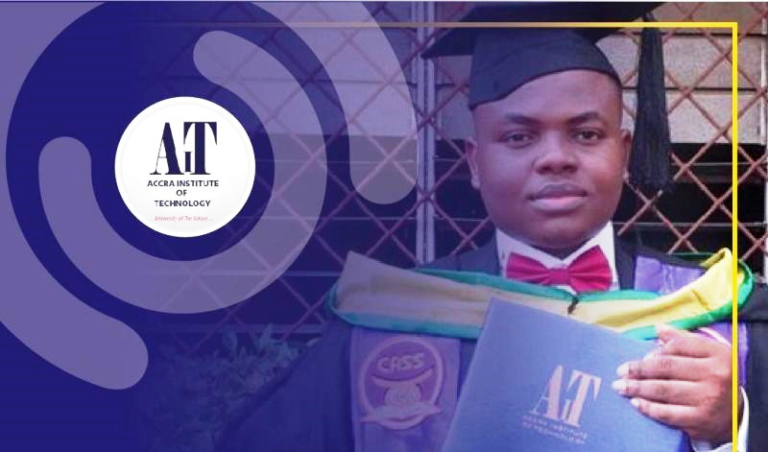The Accra Institute of Technology, AIT, is an independent technology-focused research university based in Accra, Ghana. Since its inception in 2009, AIT has extensively been deploying cutting-edge educational delivery technologies and systems to support teaching and learning in all its undergraduate and postgraduate programmes.
As one of the ECOWAS sub-region’s top education centres, AIT is home to thousands of Nigerians and other West African students. The AIT has consistently ranked as the top private University in Ghana and one of the leading educational institutions in West Africa. It has unswervingly come top at the UMB Ghana Tertiary Awards.
 In 2020 for instance, AIT won three most prestigious awards including The Most Outstanding Institution in COVID-19 Times Award, The Best Technology University Award and the Best Educator of The Year.
In 2020 for instance, AIT won three most prestigious awards including The Most Outstanding Institution in COVID-19 Times Award, The Best Technology University Award and the Best Educator of The Year.
The university has kept the flag flying producing top-notch graduates gradually occupying strategic positions as leaders across diverse sectors of Africa and the global economy.
Benefit from AIT’s decades of leadership as a Tertiary Institution
There are several potential benefits for Nigerian students attending AIT in Ghana. Some of these benefits include:
Quality Education: AIT is known for providing quality education in various fields of study. The institution offers programs that are aligned with industry standards and taught by experienced faculty members. Nigerian students can benefit from the academic excellence and practical training offered at AIT.
 International Exposure: Studying at AIT provides Nigerian students with the opportunity to gain international exposure. Interacting with students from different countries and cultures can broaden their perspectives and enhance their global awareness. This exposure can be valuable for personal growth and can also boost career prospects in an increasingly interconnected world.
International Exposure: Studying at AIT provides Nigerian students with the opportunity to gain international exposure. Interacting with students from different countries and cultures can broaden their perspectives and enhance their global awareness. This exposure can be valuable for personal growth and can also boost career prospects in an increasingly interconnected world.
Regional Networking: Ghana is situated in West Africa, and attending AIT allows Nigerian students to network with their counterparts from neighboring countries in the region. Building connections with students and professionals from Ghana and other West African nations can open up future collaborative opportunities and contribute to a stronger regional network.
Cultural Exchange: Ghana has a rich cultural heritage, and studying at AIT provides Nigerian students with the chance to immerse themselves in a different cultural environment. They can learn about Ghanaian traditions, customs, and way of life, fostering cross-cultural understanding and appreciation. This exposure can enhance their cultural competence, which is increasingly valued in today’s globalized world.
Affordability: Compared to some educational institutions in Nigeria and other countries, AIT offers relatively affordable tuition fees and living expenses. This can make it a more accessible option for Nigerian students seeking quality education abroad without significant financial burden.
 Enhanced Employability: AIT’s academic programs are designed to equip students with practical skills and knowledge relevant to their chosen fields. The institution has collaborations with industry partners, providing opportunities for internships, projects, and industry exposure. Nigerian students who graduate from AIT may have an advantage in the job market due to the institution’s reputation and industry connections.
Enhanced Employability: AIT’s academic programs are designed to equip students with practical skills and knowledge relevant to their chosen fields. The institution has collaborations with industry partners, providing opportunities for internships, projects, and industry exposure. Nigerian students who graduate from AIT may have an advantage in the job market due to the institution’s reputation and industry connections.
Alumni Network: AIT has a growing network of alumni across various industries and sectors. Nigerian students who graduate from AIT can benefit from this network, gaining access to potential mentors, job opportunities, and professional support. Alumni networks often provide a strong support system, and being part of the AIT alumni community can be advantageous for career growth and lifelong learning.
Register today at AIT. Click Here.
It’s important for prospective Nigerian students to conduct thorough research and consider their individual goals and circumstances when evaluating the benefits of attending AIT or any other educational institution abroad. For over 20 years, AIT has been helping to build Africa’s knowledge and skill sets.




